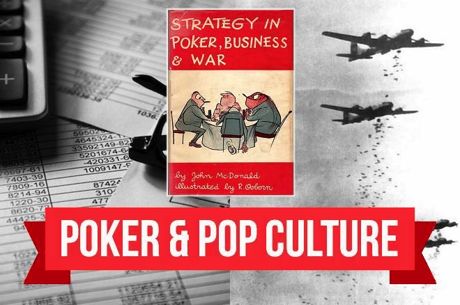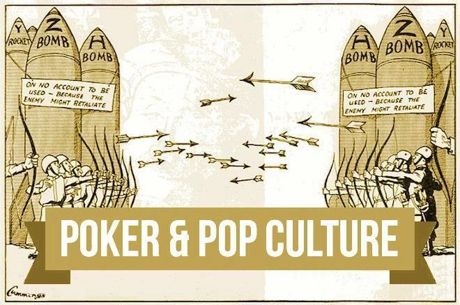Poker & Pop Culture: 'A Big Hand for the Little Lady'
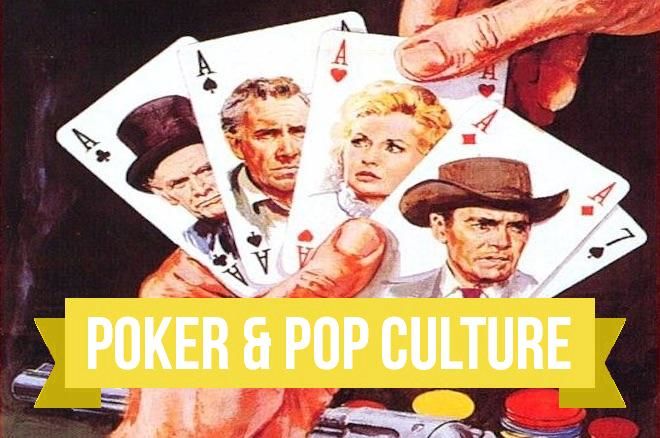
If A Streetcar Named Desire delivered a message suggesting poker was the exclusive domain of men, the 1966 western A Big Hand for the Little Lady offers a contrary view, suggesting women can compete with men at the card table �� and match wits with them more generally, too.
Directed by Fielder Cook and featuring a stellar cast, the film is based on a TV movie that appeared a few years before titled Big Deal in Laredo. Another alternate title �� Big Deal at Dodge City �� similarly mutes the "battle of the sexes" theme the film ultimately advances as Mary, the "little lady" of the title, finds herself at a table full of men in a high-stakes poker game.
As happens in Streetcar, the film similarly presents a poker as a context for "men behaving badly," albeit in a much lighter way. In Big Hand, however, the men are shown the error of their ways, including the mistaken apprehension that women can't compete with them.
"A Rough Game"
Unlike Streetcar, a gritty modern drama in which poker is important though is only featured in a couple of scenes, A Big Hand for the Little Lady qualifies as an actual "poker movie" in which the game is central to the story. Indeed, the entire plot revolves around a single poker game, and (for the most) part just one, absurdly long hand of five-card draw.
The film primarily takes place at a hotel & saloon in Laredo, Texas, circa late 19th century, the site of an annual private poker game involving "the five richest men in the territory... playing for blood." We eventually learn the game has been going on for 16 years, with the participants demonstrating their dedication by shirking all other responsibilities to be there. A lawyer, Otto Habershaw (Kevin McCarthy), is shown leaving in the middle of a capital punishment case, abandoning his obligation to defend his client's life. Another player, Henry Drummond (Jason Robards), takes off in the middle of his daughter's wedding to be there.
Clearly, this is an important game.
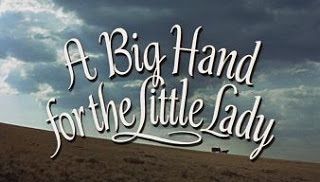
The group of five finally assemble in a private room and commence play while curious locals gossip outside. A few days into the game, a man and wife arrive at the hotel with their young son and request a room. Passing through on their way to San Antonio, the family's wagon is in need of repair, and although the hotel is mainly for cattlemen, the proprietor agrees to set them up for the night.
The father, Meredith (Henry Fonda), witnesses with special interest an exchange behind the counter of $3,000 for poker chips, and ends up inquiring about the game. It soon becomes evident that Meredith has a severe gambling problem �� he's on the "poker wagon" �� and while his wife, Mary (Joanne Woodward), is down the road at the blacksmith's, Meredith manages to get himself invited into the game.
They're playing five-card draw and "table stakes." That means a player is not allowed to bet more than he has on the table when a hand begins, although we subsequently see that rule is not strictly observed. Finally, they also play what they call "western rules," meaning a person is not allowed to "tap out" if he hasn't got enough to bet. In other words, there are no side pots. If the betting gets too high and a player hasn't enough to call, that player must "bow out" of the hand and lose whatever he's put into the pot.
"That's a rough game," says Meredith upon hearing the rules. "The game we play," comes the response.
"The First Rule of the Game of Poker... Put Up or Shut Up!"
It doesn't take long before we realize Meredith is in over his head. He's sweating, growing increasingly edgy, and after losing yet another pot is talking out loud about his bad luck.
"It's a question of averages... the cards are due to break for me," he insists. "Famous last words," says the grim, no-nonsense undertaker Benson Tropp (Charles Bickford).
"I can see now why the old lady made you quit this game," taunts Drummond, one of a number of comments highlighting the group's belief that Mary is the one in charge of the household.
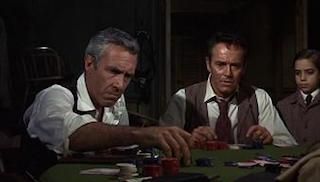
Then comes a most curious hand of five-card draw in which, incredibly, all six of the players apparently have strong hands. Meredith, down to his last few hundred when the hand begins, finds himself bet out of the hand.
Desperate, he gives his cards to his son, then rushes up to the room to collect $3,000 more �� the family's entire savings �� with which he's allowed to buy more chips. (As noted, they seem to ignore the "table stakes" rule.)
The betting resumes, but with all of the reraising Meredith again finds himself bet out of the hand. He's put all he has into the pot, yet needs $500 more to call. And even if he does call, he can't close the betting.
When Meredith objects to the punishing "Western rules," Wilcox responds.
"Now look, mister," he says. "The first rule of the game of poker, whether you're playing Eastern or Western rules, or the kind they play at the North Pole, is put up or shut up!"
Along Comes Mary
It is at this moment Mary returns, horrified to find Meredith in the game risking their nest egg. "Look here... we don't allow no woman in here!" objects Tropp.
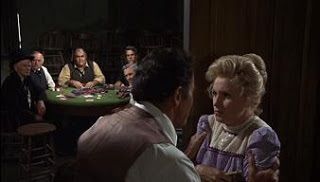
Meredith tries frantically to explain to Mary how he's got a sure winner, the kind of hand that only comes "once in a lifetime." Meanwhile, he is failing in his efforts to raise funds by selling the family's wagon to one of the players.
Finally, overcome with the stress of the situation, Meredith falls to the floor, the victim of an apparent heart attack.
While a doctor (Burgess Meredith) attends to the ailing Meredith, Drummond callously calls out "Doc, I just want to ask a simple question. Is he going to be able to finish this hand?" An upset Mary goes to her husband, and in his delirium he hands his cards to her, indicating that she is going to have to finish the hand for him.
She agrees to do so, and takes a seat at the table. First, though, she has a question.
"How do you play this game?"
From there the comically convoluted story shows Mary getting a quick poker primer, then having the idea to go across the street to the Cattle and Merchants Bank to attempt to secure a loan with the other players accompanying her. When asked what collateral she has by the bank's owner, the venerable C.P. Ballinger (Paul Ford), she shows him her "big hand."
"Isn't it a good hand? Isn't it a very good hand of poker?" she asks. "Don't you know?" asks an incredulous Ballinger. He thinks it's all a big joke, adding that he "can't tolerate liquor, cards, and women" before ejecting all of them angrily from his bank.
Once they've reassembled at the table, though, Ballinger turns up. Realizing the game and hand are as described to him, he delivers a speech about his 46 years in banking. Then, holding Mary's cards, he announces "I have never been offered a better piece of collateral than I hold in my hand right now!"
The men around the table are all aghast as they watch Ballinger help Mary call the bet to bring the pot to $21,000, then raise another $5,000. They're all convinced, and one by one each of them folds.
Changes of Heart, and a Big Twist
After the hand ends, Mary and Ballinger cash out and leave to check on the ailing Meredith. We then see the men each in various ways show they've been transformed by the experience, their dim views of women having been altered by the "big hand" with the "little lady."
Wilcox says he's going home to his wife whom he's neglected for a couple of months. The undertaker Tropp �� the most misogynist of the bunch who at one point earlier exclaimed "I hate women!" �� bids Mary adieu by telling her "It's been a pleasure, ma'am," clearly signaling he's had a change of heart about women, too.
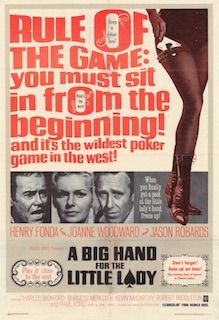
The others have a conversation about women. One asks "How many good women have you met in your life?" and Habershaw wistfully answers "one" (referring to Mary). Drummond then goes home to his daughter's wedding �� still being paused days after it begun �� and sends off his prospective son-in-law from what is clearly not a marriage for love, but money. He, too, seems to have been spellbound somewhat by Mary's example.
That's one twist of the plot �� namely the poker-playing men all having learned a lesson about women. Another even larger one follows to conclude the film.
Over in a neighboring town of Black Creek, the family, Ballinger and Doc all assemble and divide the money, and soon it becomes evident they were all in on a big scam. In fact, Mary and Meredith aren't even married �� his real name is "Benny," she's "Ruby" �� and they've borrowed their "son" just for the ruse. They're both tricksters and card sharps, with Ruby in fact Ballinger's girlfriend. Meanwhile Doc and Ballinger were both avenging separate grievances, explaining their participation.
Ruby then goes to play in a high-stakes poker game, with Ballinger complaining she'd promised to quit after they'd pulled off the scam �� a comic reversal of "Mary" complaining earlier about "Meredith" and his gambling problem.
A Lesson for the Men
A Big Hand for the Little Lady is both entertaining and witty at times, and to me deserves a spot somewhere on those "best poker movie" lists. Not everyone agrees. In Total Poker, David Spanier has a couple of positive things to say about the film, but ultimately he finds it a mostly "silly story." Meanwhile Anthony Holden in Big Deal points out the obvious rule-breaking that occurs, suggesting that upon witnessing these transgressions "the serious poker player will return to his game without watching further."
While the story is a little silly and the disregarding of rules perhaps bothersome to "the serious poker player," the film does offer a meaningful counterpoint to other cultural portrayals of the game that exclude women altogether, or like Streetcar use to poker to help dramatize a destructive divide between the sexes.
Some of these points about women are made heavy-handedly in Big Hand, but others are more subtly shown. Even the choice of name for Henry Fonda's character "Meredith" �� a woman's name �� is inspired, given how the other men in the game are consistently targeting his seeming lack of "manliness."
When they learn about Mary having made Meredith give up gambling ("little woman make you give it up?"), they have a big laugh over the idea of their wives asking them to quit poker, such a challenge to their authority by women seeming unthinkable to them. When he shuffles, Wilcox says he handles the cards "just like my old grandma used to."
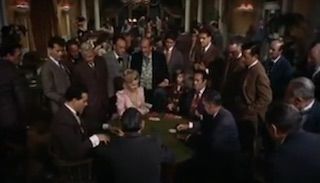
Such chauvinistic boorishness continues when the men contemplate the ridiculousness of Mary stepping in to take over the hand, though as noted everyone becomes "reformed" by her ability to find a way to win the hand.
It seems the filmmakers might have wanted to reform the audience somewhat in this regard, too, encouraging them to think differently about women and men and poker, a point emphasized by the film's final shot of Ruby dealing the cards to a table full of men (and men surrounding the table to watch).
We never do find out what the "big hand" really was, though a outright bluff would have been most appropriate, paralleling the elaborate bluff the (almost) entire film pulls on the audience. We know for sure, though, that Mary (or Ruby) is no "little lady," having more than ably stood up to men in the game.
From the forthcoming "Poker & Pop Culture: Telling the Story of America's Favorite Card Game." Martin Harris teaches a course in "Poker in American Film and Culture" in the American Studies program at UNC-Charlotte.

